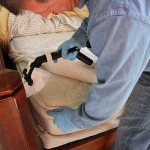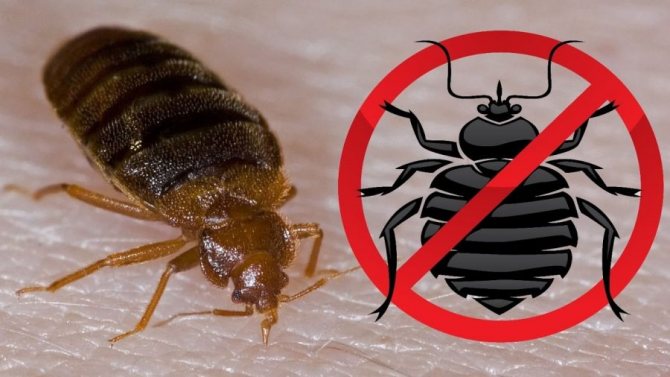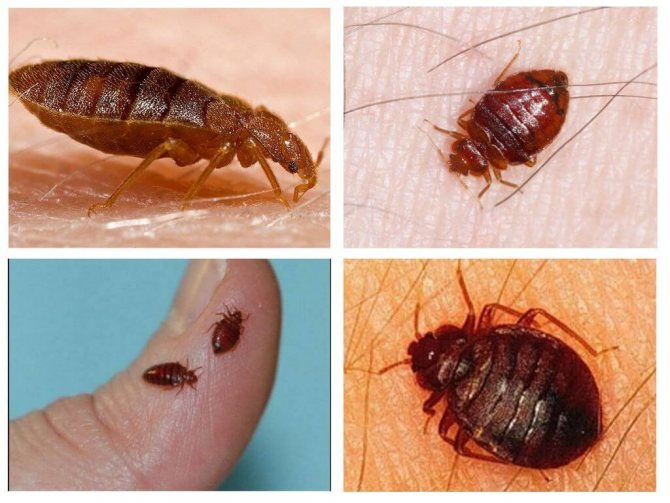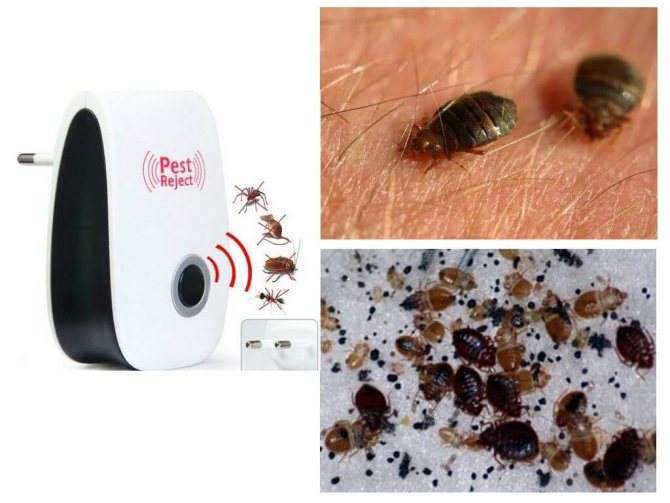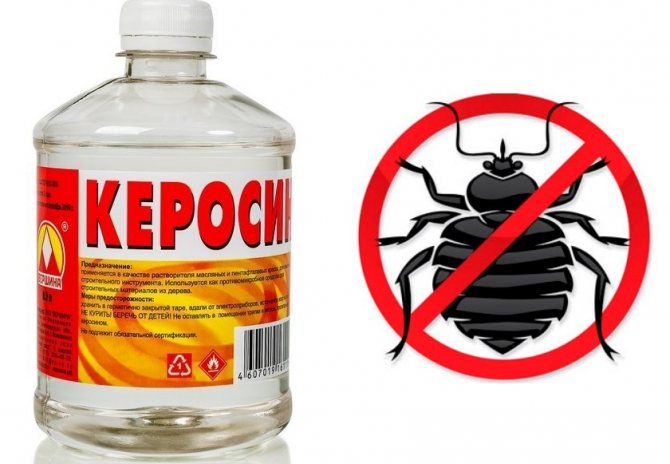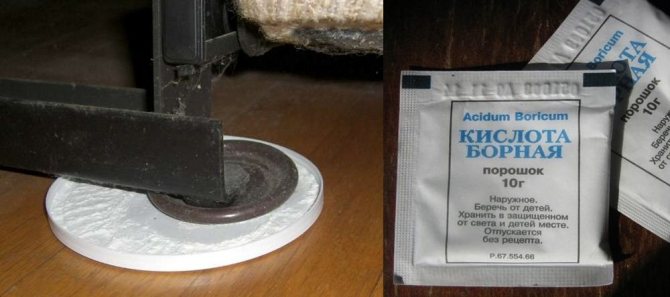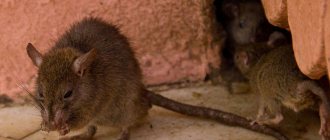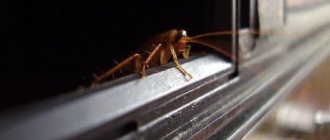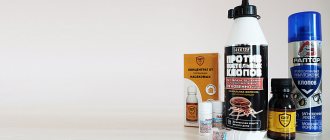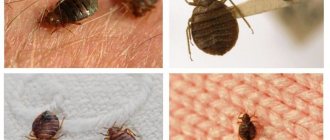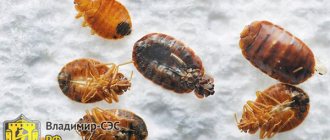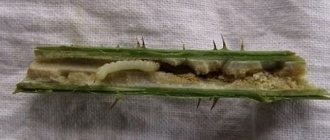Many people recommend this remedy for bedbugs. Read >>>!
Bed bugs that have settled in a room can cause a lot of trouble and inconvenience to apartment residents. But what are the bugs afraid of?
Numerous painful bites found on the body in the morning are a signal for immediate action. (Read - Bed bug bite symptoms)
But what if there is no time to treat insects? Here you can recall that our grandparents did not have the opportunity to contact the special services and order the arrival of specialists, but used folk remedies to cope with an unwanted neighborhood.
Without hesitation for a long time, you can take advantage of proven experience over the years, and resort to methods that bed bloodsuckers will probably not like.

Of course, herbs or simple remedies will not be able to have a destructive effect on parasites, but they can hide for a while, and in some cases even leave the apartment for a short time.
What will not like the ubiquitous bloodsuckers and what are bed bugs afraid of?
Will bedbugs go away if you use the means they are afraid of?
Let's start with the main thing: bed bugs cannot be scared away from the apartment... While there are things that bedbugs are really afraid of, there is no way to use these things to keep bedbugs away. Practice shows (and theory proves it) that bedbugs in the room can either be killed or you can continue to feed them with your blood.
The video below shows the treatment in an apartment in which they tried to scare off bedbugs, first with tansy, and then with essential oils:
We do not know of a single case when people, after the fait accompli of the infection of the apartment, would be able to scare off bedbugs from it. We have encountered situations that seemed to be similar to this, but most likely it was not about scaring.
For example, there was a case when a person caught a bug on the bed, crushed it, sprinkled vinegar in the corners and did not see any more bugs at home. The man believes that it was with vinegar that he was able to scare off bedbugs. We believe that in this situation a person brought home one bug on his clothes or in a bag, by a lucky coincidence he saw and killed this one bug, and the vinegar did not affect anyone, simply because there was not a single living bug left in the room. That is, in this case, there was no fact of infection of the apartment: the bugs did not begin to multiply here.
If the bugs in the apartment clearly began to multiply, it is impossible to scare away all of them, but not destroy.
Outcomes
This is the end, the apogee, the final stage of the article describing what bed bugs are afraid of. A short summary should be drawn up. Ah, here it is!
"Veins" stagger from:
- Dried herbs with pungent odors;
- Insecticides purchased in the markets or prepared with your own hands from available household products (how to prepare poison against bedbugs at home - written here);
- High and low temperatures;
- Steam, washing machines, dryers, irons.
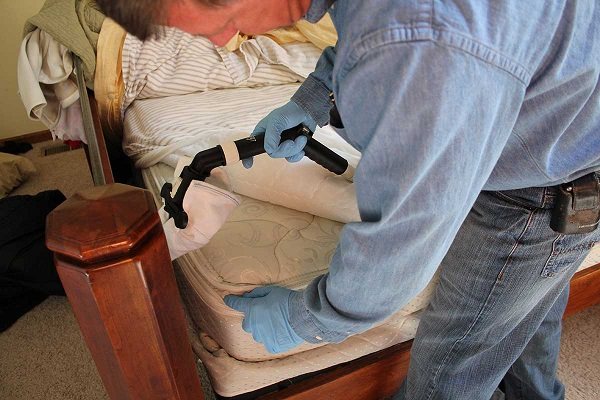

The proboscis does not dangle from:
- Soap, soda, salt;
- Spells;
- Ultrasonic appliances.
Light humor never hurt business, but that's not the point. As soon as you realize that you are dealing with bloodsuckers, immediately arm yourself with this list. Further, follow the indicated procedures and ferment insects fruitfully!
Why can't bedbugs be scared away from the apartment?
There are several reasons for the fundamental impossibility of driving bedbugs out of the apartment. The first is that bedbugs have nowhere to go. They do not know that it is possible to leave this room to the neighbors, because in their entire life most of them do not move such distances.
There are times when they can crawl along the heating riser from the apartment upstairs to you every night, and crawl there the next morning. However, this is rare, and most bedbugs only know the route from the daytime shelter to and from the bed. If something appears in the apartment that they are afraid of, they will prefer to simply endure in shelters, and then, when they are very hungry, they will crawl out, despite the unpleasant smell for them.
Sometimes people have a false impression that if neighbors poison bedbugs, then insects are afraid of funds and run to neighboring apartments. In fact, when baited with chemical insecticides, bugs do not run anywhere. They can crawl out of their shelters, they can die in these shelters, but, in fact, they cannot escape from the premises.
Indeed, migration occurs when people systematically open the bedbugs' hiding places. Insects try to hide in new dark secluded places, people open them too, insects crawl into new shelters and some of them fall into cracks in the walls, into sockets and electrical wiring grooves, into ventilation, and these are already passages to neighboring apartments. Of these, this part of the bugs is taken to the neighbors.
But such a situation is possible when neighbors either very carefully open all the nests of bedbugs, which rarely happens (more often people are lazy and don’t do it), or when neighbors make repairs and all walls, floors, ceilings are cleaned to concrete, that is, they simply deprive bedbugs of shelters ... Bedbugs, accordingly, can hide only in such paths that lead to your home, and along these paths they penetrate into your apartment. One gets the impression that they are "running" out of fear, but in reality they are just doing what they have been doing all the time before - hiding in the safest places.
If bedbugs have hiding places specifically in your apartment, you will not drive these parasites away with any deterrent. If they are afraid of anything, they will simply hide in these places. This will not make it easier for homeowners.
The second reason: bedbugs quickly adapt to many deterrents, even if initially they were afraid of such drugs. This is very clearly seen in practice: if you put a branch of wormwood under an uninfected bed, then for a day or two parasites will not climb onto this bed. But then, one by two, they will begin to get out from behind the baseboards, bypass this wormwood and climb onto the bed, and when each individual repeats this two or three times, she will no longer pay attention to this remedy. This is already happening for a third reason: hunger is stronger than fear.
This rule works throughout the animal kingdom, in humans, too. For a day or two, while the bugs are not hungry, they may not bite if they are afraid of some remedy. When they are really hungry, they can overcome their fear in order to find food.
It is well known that very hungry bugs can get out and bite even in light, although in general they are more afraid of light than most other environmental factors. And if they can bite in the light, then they will also bite with the smell of bleach, tansy or some kind of essential oil.
And the fourth reason: not all the means that are considered to repel bedbugs really scare them away. There are unambiguous dummies, for example, ultrasonic or electromagnetic scarers. There are remedies that bugs are afraid of, but get used to. There are means, the principle of which people do not fully understand.
For example, the same vinegar: if it gets on a bug, it kills it. But if you just sprinkle vinegar on furniture and walls, then its smell will scare off bedbugs for two to three days.After that, the parasites will get used to it and will calmly run over the vinegar-stinking baseboards. Moreover, the smell of vinegar will fade over time.
From here we conclude: no means can drive bugs out of the apartment. Even if they are afraid of certain smells, or, for example, light, then for a short time you can reduce the strength and frequency of their bites, but after a few days everything will return to its place.
Now let's go over specifically the most famous means, phenomena and environmental factors that bedbugs are supposedly afraid of.
Harsh aromas
If the bugs are not constantly scared away, then they will fill the apartment and the fight against them will become more difficult in the future. When parasitic colonies are found, it is important to establish possible ways of their penetration into the living space in order to prevent new colonies in the future.
House bugs are very much afraid of some odors, which are captured by developed olfactory receptors. Fresh herbs are used from natural repelling agents.
Sagebrush
An effective and inexpensive tool that drives away insects for a long time. The plant is harvested on its own or bought at a pharmacy. It is more effective to take fresh, but even in dried form, the effect is not much weaker.
Bunches of wormwood are laid out in different places in the apartment, where the presence of bedbugs is possible: under carpets and rugs, in sofas, armchairs and furniture. It will not destroy them, but it will definitely scare them away. The downside is that the pungent aroma of wormwood does not in any way affect the eggs of the parasites.
The harmful effect lasts for 3-4 days, then the grass is replaced with fresh one. For this period, people living in the apartment will be able to rest or carry out treatment with insecticidal preparations.
The layout of the plant near outlets, ventilation shafts, thresholds helps against the migration of neighboring bloodsuckers. Then the parasites pass by. Before spreading the herbs, they carry out a general cleaning.


Tansy
The bugs are afraid of this stocky grass, with yellow flowers, just like wormwood. Use fresh, dried or prepare a decoction.
The bundles are placed under mattresses, sleeping furniture and other places where insects accumulate. The decoction will require 200 g of herbal raw materials per liter of water. Boil, cool and filter. The resulting composition is sprayed over the living quarters. The clutches cannot be exterminated this way, but the insects escape.
Calamus
To combat parasites, it is recommended to purchase ready-made calamus herb at the pharmacy. It is produced in the form of a powder, which is scattered in the places where bedbugs are dislocated. The grass is not harmful to humans and pets. No less productive in terms of destroying parasites, decoctions and infusions.
Chamomile
Bedbugs do not tolerate chamomile scent. Dalmatian chamomile, which is more saturated with essential oils, is suitable. An alternative would be a pharmacy, weaker in terms of the degree of impact, but not much.
An analogue of pharmacy chamomile will be a drug called Pyrethrum. The herb is part of it. The agent has a calming effect on people, and a deterrent on bedbugs.
Bay leaf
Another option for expelling blood-sucking insects from the house. Every housewife has a bay leaf, as it is used in cooking to give dishes a piquant aroma. But the bugs cannot stand this smell and retreat home.
Sheets are laid out in the room, in unlimited quantities. They make infusions, with which all surfaces in the house are treated. This will protect against the invasion of bed bugs for several days.
Cold and frost
Like any living creatures, bedbugs do not tolerate too low temperatures and die with them. At temperatures below 9 ° C, they stop multiplying, in any frost they fall into a daze, at a temperature of -17 ° C they die per day. Therefore, if they begin to freeze and have the opportunity to move to a warmer place, they will move there.If you try to freeze them out of the apartment, this will not happen, because the bugs living in sleeping places and in different shelters in the apartment simply do not know where to run to warm themselves. They will go into a daze right in the shelters, and if the temperature is too low, they will die.
Only some of the bugs that live on the border of warm and cold rooms will be able to move to where it is warmer. These insects are relatively few.
Simply put, if you try to influence the bugs with cold, constantly ventilate the apartment and lower the temperature here even to 0 ° C at night or for the day, this will not work. Bedbugs will safely survive this cooling and will bite again upon completion. Those bugs that live in the sofa, behind the baseboards and behind furniture, will not go anywhere and will not die from such a cold. If you try to lower the temperature in the room to -17 - -20 ° C for a couple of days, your radiators and water pipes will burst. We'll have to make repairs, and this is more difficult than destroying bedbugs.
Chemistry: kerosene, denatured alcohol, turpentine, acetone, vinegar
In addition to plant materials (and in urban conditions it is quite difficult to get hold of fresh plants with a strong smell), you can use some chemicals that are undoubtedly found in every apartment. These include:
- ammonia;
- turpentine;
- acetone;
- refined kerosene.
It is quite simple to use chemicals - by applying to all surfaces where bed parasites have previously been noticed.
The weekend planned to spend outside the city is a great opportunity to try to scare off the bloodsuckers for a while.
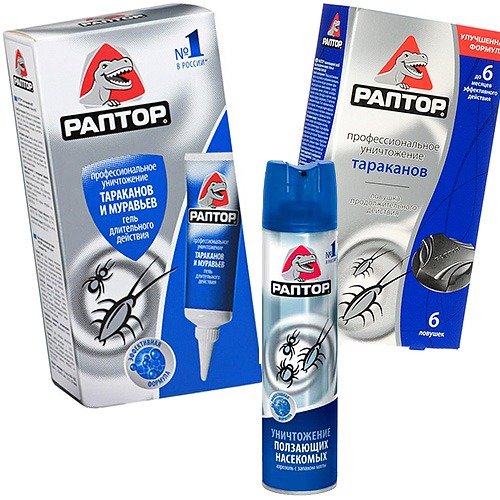

Before leaving, apply chemicals with a spray to all secluded corners and you can safely go for a walk - the bugs will definitely not meet the owners in a few days, since they will try to get away.
If you need to act on bed bugs immediately, and there is no way to leave the apartment for a long time, you can thoroughly ventilate the entire room after processing. This method can be used only as a last resort, when you cannot endure sleepless nights accompanied by parasite bites.
Shine
Bedbugs are really afraid of light and normally do not bite either in the light of the sun or in artificial lighting. But if you just do not turn off the light in the room at night, then on the third or fourth day the bugs will begin to crawl out and bite people in the light. This is verified.
We filmed the videos where our volunteers were bitten by bedbugs in the evening in the light, and the parasites bite safely, sucked blood and did not think to run away somewhere:
And many people tell us that after a long absence in the room, they were bitten in daylight. That is, the bugs are afraid of light, but only when they are full and happy, and as if they are not afraid of it enough to leave the constantly illuminated room.
Habitat
It is important to understand that scary agents do not kill insects, but are driven out of their homes or are not allowed into the entrusted territory. Therefore, they rather serve as a prevention and a barrier, but do not help to completely destroy mass congestions.
Every living organism exists comfortably in conditions acceptable to itself, bedbugs are no exception.
Temperature
Bed bugs come from tropical countries, so they prefer warmth. The optimal temperature regime for their life is from 20 to 30 ° C, inherent in apartment conditions. When the column rises or falls, the parasites stop multiplying and try to quickly leave the uncomfortable room.
Trying to expel bedbugs by adjusting the temperature is a futile exercise. This is acceptable only in industrial premises, since a low or high degree must be maintained constantly, for at least six months.


For home use, the option of freezing or heating is suitable. In the first case, things and interior items are taken out into the street in winter, for at least two days.In the summer, they are packed in bags and placed in the freezer, for 3-4 hours.
The second option involves scalding bedbug nests with boiling water. Furniture, carpets and other flat surfaces are treated with a steam generator.
Shine
Since bed bugs are nocturnal, they are thought to be afraid of light. Indeed, insects crawl out to get enough of human blood from 3 to 6 o'clock in the morning. This phenomenon has nothing to do with light.
It is safer for parasites to bite a sleeping person when they are unable to resist. Starving parasites crawl out in the daytime. So people who are accustomed to sleeping off during this period of time are also in danger from bloodsuckers.
Household chemicals with a strong odor
These funds include:
- Chlorine and other chlorine compounds
- White
- Vinegar
- Kerosene
- Ammonium or common alcohol
- Ammonia
- Acetone
- Vinegar essence
... and the like. All these are caustic substances with a strong odor. It is believed that it is their smell that bugs are afraid of. This is partly true: as soon as such a smell appears in the room, the bugs prefer to sit out in shelters. But only until the moment when they get very hungry. When they are hungry, they will crawl out, regardless of the smell of bleach or kerosene, and will crawl to bite people on the walls on which these substances have dried.
After drying, such agents do not have a residual effect and will not kill bedbugs crawling over dried surfaces.
If the same vinegar or whiteness gets directly on the bug, then the insect will die. Therefore, in principle, such means can be used to treat the found nests, although modern insecticides are much more effective, but at the same time they do not stink so much, do not leave traces and do not create a risk of fire. But if you open all the nests of bedbugs, you can destroy them all at once and you no longer have to scare them away.
On a note
But boric acid, which is quite effective against cockroaches, does not destroy bedbugs. In order to be poisoned by it, the insect must eat it, and the bugs are not capable of this.
Laundry and tar soap, as well as tar, are completely useless from bedbugs. They do not frighten bedbugs by smell, nor can they kill parasites by their action. The same is true for vanillin and fish oil (I wonder why anyone at all would have thought that fish oil can scare off bedbugs?).
Someone is trying to scare off bedbugs with hydrogen peroxide. In reality, due to the lack of smell, the bugs do not pay attention to it at all, but if you pour it on them directly, they will die quickly enough.
And another dangerous thing is naphthalene. Bedbugs are not afraid of him, but they die from contact with him. But it is also presumably a carcinogen and its presence in a living room is much more dangerous than the presence of bed bugs.
Folk remedies
In addition to using herbs against parasites, folk remedies include several effective recipes from improvised products:
- Mix baking soda and vanillin in equal proportions. The resulting powder is scattered in secluded places, potential accommodation facilities for bedbugs.
- Combine salt (4-5 tablespoons) with vanilla, in the amount of one dessert spoon. The mixture is poured under sofas, beds, carpets, for baseboards. Leave for 2-3 hours, then vacuum. Even after cleaning, a pleasant smell for humans, but unbearable for insects, hovers in the room.
But bugs are not at all afraid of garlic, despite its corrosive aroma.
Plant smells
According to our statistics, this is a favorite pastime of those who have not yet been bitten too much by the bugs - to try to scare them away with smells. The whole company compiled a list of such funds when we remembered how people tried to scare the bugs:
- Sagebrush
- Black cohosh
- Garlic
- Lavender
- Mint
- Mustard
- Valerian
- Tobacco
- Chamomile
- Eucalyptus
- Geranium
- Needles
- Birch buds and birch bark
- Orange
- Bay leaf
- Fern
And here is a fern or birch bark, it is not clear, because they practically do not smell.But the smell of geranium can drive people out of the apartment, but not bedbugs, although for some it is a normal houseplant.


Many people get headaches from the smell of geranium.
In general, all these herbs are countless - if the grass has a smell, someone will certainly try to scare off bedbugs with it. But we have already talked about the result: to scare off bedbugs for good at least with some such grass separately, although no one has yet succeeded in a whole bunch of them. We do not know of such cases. I think if there was such a grass that can drive bedbugs out of the apartment, we would have lost our job long ago.
Home chemistry
How to scare off bedbugs? In the fight against parasites, vinegar, denatured alcohol, turpentine, kerosene, transformer oil and acetone are often used. They are also very good at repelling bed bugs. Just a few drops of any of these products applied to a surface can ward off parasites for several weeks.


These drugs also include common ammonia. It is added to water for washing and damp cleaning. The smell of ammonia in the air creates very uncomfortable conditions for insects.
Read more about folk remedies for bedbugs in this article.
Essential oils
It's the same here as with herbs. Only if some herbs smell unpleasant, then people love essential oils, because they seem to fight with bugs, and, it seems, there is a divine aroma in the apartment.
But you already understand that if a bug has a question of life and death, either it crawls out and bites a person at the smell of some tea tree oil, or it dies of hunger, it will crawl out and bite.
By the way, turpentine should be included in the same category - this is also an essential oil from different parts of conifers. Only it smells not as pleasant for a person as eucalyptus oil. But bedbugs do not care, they react to turpentine in the same way as to any other oil.
In the same category, Zvezdochka balm is a mixture of essential oils on a fat basis with the same inaction on bedbugs as pure aromatic oils.
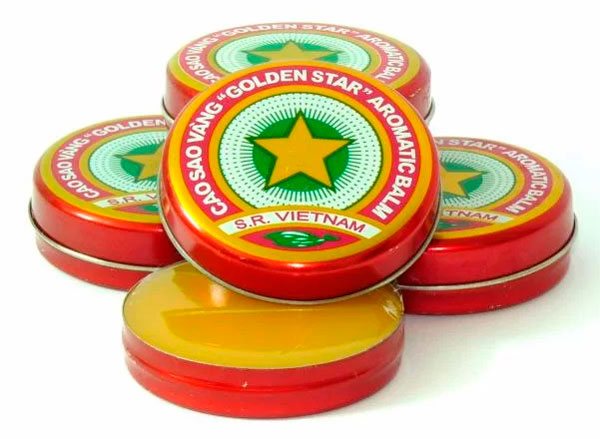

Various perfumery products are completely analogous to oils: perfumes, colognes, deodorants. To some extent, a heavily perfumed person will be bitten less aggressively by bedbugs, in part because the smell of perfume will mask the smell of sweat and carbon dioxide that bugs are guided by when searching for a person. But perfumery is not able to reliably protect against their bites.
Shop insecticides
This is the most reliable and effective remedy for home bed bugs. In stores you will find a lot of different drugs. They have five forms:
- Aerosols - "Clean House", "Combat", "Raptor", "Reid", "Dichlorvos", "Antiklop", "Karbozol", "Perfos-P", "Prima-U", "Bona Forte";
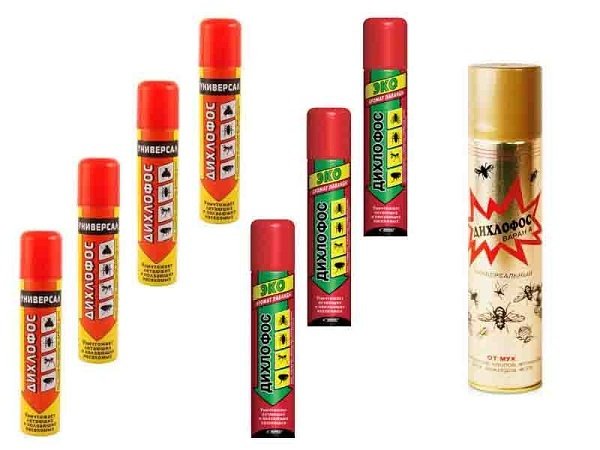

- Powders (dusts) - "Klopoveron", "Riapan", "Fenaxin", "Clean House", "Fas-Double", "Anti-bug", "Deadly Power";
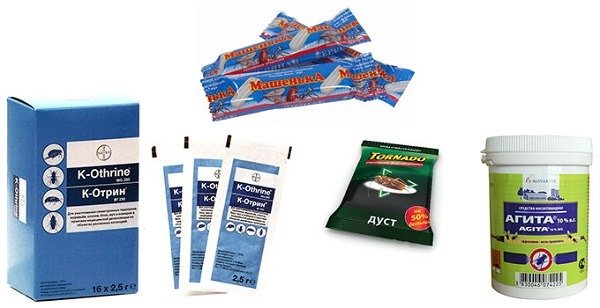

- Concentrated emulsions - "Fufanon", "Lambda zone", "Ksulat C25", "Medilis Ziper", "Get", "Dobrokhim FOS", "Dobrokhim Micro", "Avalont", "Agrant";


- Gels - "Fas", "Fumitoks", "Absolute", "Global", "Brownie";
- Crayons - "Mashenka", "Clean House".


When working with chemical insecticides, it is necessary to use protective equipment - rubber gloves, goggles, a long-sleeved robe and a respirator.
You need to know: what is the best poison against bedbugs? 15 effective remedies!
Steam from an iron and boiling water
To say that bugs are afraid of steam or boiling water would not be entirely correct. When steam or boiling water hits them, they die. If the sofa was processed by steam, but the bugs survived somewhere in the depths of the structure, then they will safely run around the place where the steam has settled and cooled down, and will not be afraid of it. That is, again, steam from an iron or a steam generator can destroy them by processing directly, but they cannot be scared away.
In the same way, bugs are not afraid of clean water, or, for example, water with salt, soda at all. That is, splashing salt water in the corners is useless.
In no case do I want to offend anyone's feelings, but the holy water from the church also does not frighten or kill bedbugs. Boiling water is more effective for this. Even just warm water with a temperature of 50-55 ° C kills bedbugs in a few minutes. Therefore, in linen and clothes, they can be destroyed when washed in a washing machine.
But bugs are not afraid of normal heat. 33-35 degrees for them is quite a tolerable temperature. They already do not tolerate temperatures above 40 ° C, but they still do not die, and begin to die out at 45 ° C heat. At the same time, the level of humidity has little effect on their condition even at high temperatures.
You've probably already noticed that we have listed almost all the popular methods of dealing with bedbugs. Alas, this is so: so far we have carried out more than 15,000 treatments for bedbugs and we have no reason to believe that any of these methods can reliably get rid of bedbugs. Perhaps there is such a method and we simply did not communicate with the people whom it helped. Perhaps there are situations when, under the confluence of circumstances, folk remedies and methods work. But we have not heard about such precedents.
Temperature difference
Most of all, bugs are afraid of temperature changes. A positive temperature, which reaches 20-30 ° C, is favorable for their habitat. Lowering it by 10-15 degrees has a bad effect on their reproduction. If they are poisoned in this way for a long time, the bloodsuckers will leave and find other owners for themselves, where they will feel comfortable. In winter, you can open the windows in the apartment for 2-3 days so that the bugs leave your home. Temporary ventilation will not help.
The above methods scare away bloodsuckers, but will not help get rid of them forever. Therefore, the best option is to contact special services that will carry out pest control, or purchase effective means to destroy bedbugs.
Preventive measures against bedbugs
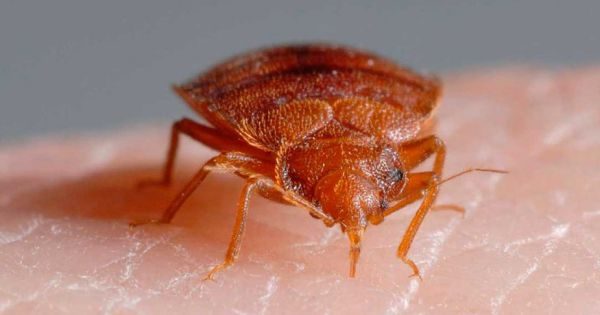

Preventive measures can help keep insects and their eggs from entering the house.
Systematic careful processing of premises is the main way to prevent the appearance of bloodsuckers:
- Cleaning, drying in the sun and winter freezing of carpets.
- Periodic inspection of cracks, skirting boards and walls.
- Regular washing, ironing of bed linen.
What else do bugs dislike?
Nocturnal parasites love cozy warm places where there is little light. They are attracted by human blood and carbon dioxide. It is through this gas that they find a person.
It turns out that bedbugs love to travel. They are able to follow a person in his clothes or things. Having drunk blood 1 time in 7 days, the parasite will try to lie down in things, because the temperature of the human body is too high for it. But then the parasite will find its host again. According to the latest scientific evidence, bugs love synthetic fabric. They give preference to synthetic upholstery of furniture, clothes, things.
Also, insect experts claim that bugs love bean leaves. Even special traps are being developed that mimic the villi of the leaves of this plant to attract parasites. After bedbugs fall into traps, they will be burned along with the pests.
How can bed bugs be killed? You should not expect that simple folk methods will lead to the death of bloodsuckers - in most cases they are aimed at scaring away insects.
Of course, you can use boiling water or send things with parasites in the cold, but you cannot completely clean the room.
If you need to use means for extermination, you will have to resort to stronger drugs from which insects die.
By the way, read the review - Remedies for bedbugs.
You can independently prepare a mixture that is destructive for bed bloodsuckers. For this, they usually use:
- turpentine;
- naphthalene;
- transformer oil;
- denatured alcohol;
- ammonia alcohol;
- acetone.
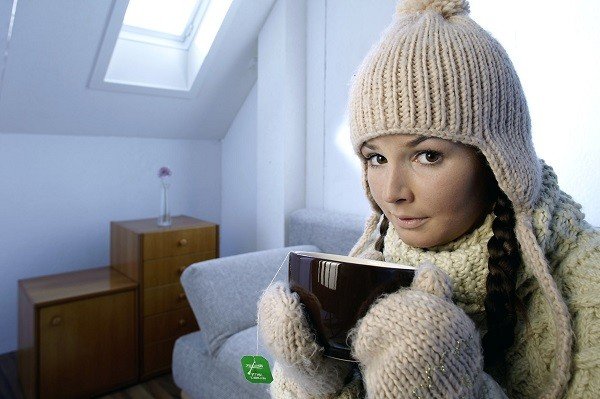

Preparation of the mixture is important, because you need to be careful - improper use of chemicals can lead to burns.
Protective equipment will not interfere - gloves on hands and a respirator on the face. Protective clothing should also not be neglected during the application of the preparations.

